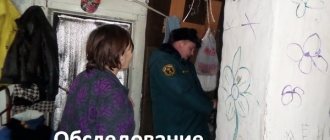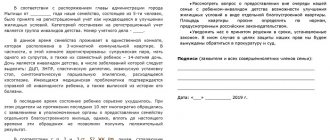What kind of organization is this and who is included in it?
An interdepartmental commission is an organization that examines issues regarding dilapidated and dilapidated housing, studies all aspects and makes a decision on declaring housing unfit for human habitation.
The composition of the commission is individual for each city , town or other administrative unit and is approved by the district or city administration.
The commission may include:
- representatives of the locality administration;
- employees of the department of architecture, urban planning;
- meeting of deputies;
- department of supervisory activities;
- representatives of the Ministry of Emergency Situations;
- Rospotrebnadzor department;
- BTI employees;
- Chairman of the HOA, cooperative, management company.
The creation of a commission is preceded by a corresponding decision of local executive authorities.
The chairman of the commission is an official of this authority. He conducts meetings, issues relevant instructions within the competence of each member of the commission, represents the commission in various bodies, signs the protocol, decision and other documents on the case.
The secretary prepares documents and keeps minutes of each meeting . It also works with residents' statements.
In its work, such a commission is guided by the Constitutions of the Russian Federation, the Housing Code of the Russian Federation, Resolution No. 47 and other regulations.
Information about the Real Estate Commission of the Consumer Society of St. Petersburg and Leningrad Region
Home > Goals and objectives of the Real Estate Commission
our work
The Real Estate Commission of the Consumer Society of St. Petersburg and the Leningrad Region has been protecting the rights of buyers and homeowners for 14 years. The commission began its work in St. Petersburg in October 2006, as one of the sections of the Consumer Society of St. Petersburg and the Leningrad Region . Its goal is to protect the rights and interests of consumers in relations with participants in the real estate market.
The main goal of the real estate commission is to protect the legal rights and interests of consumers, both in the primary and secondary real estate markets.
Protection for violations of the rights of citizens in the field of shared-equity construction (protection of the rights of citizens in case of violation of the terms of the contract, failure to put a house into operation, transfer of ownership of an apartment, the presence of construction defects) Legal support of purchase and sale transactions (consultation before purchase, analysis of the draft contract)
Consulting on the privatization of apartments, rooms, land plots with buildings, as well as their exchange, resettlement, donation and inheritance.
Consulting on the activities of HOAs, housing cooperatives (meetings, voting, tariffs, change of board)
Reception of claims and consideration of complaints from real estate market consumers
Activities of the real estate commission
- development and implementation of programs to protect consumer rights;
- holding lectures, conferences, seminars, meetings and other educational events in the field of consumer protection in the real estate sector;
- annual organization and holding of the “Consumer Trust” competition with the aim of compiling a consumer rating of companies in the real estate market (developers, realtors, management companies, mortgage banks) that deserve consumer trust;
- providing recommendations and advice from specialists on legal issues of protecting consumer rights in accordance with the Law “On Protection of Consumer Rights”;
- conducting pre-trial claims cases in order to protect consumer rights;
- consumer protection in litigation;
- conducting and organizing an independent examination of the contract with the developer with the issuance of a written expert opinion;
- implementation of measures to improve the legal culture and literacy of the population regarding their rights in the field of real estate.
The Real Estate Commission of the Consumer Society of St. Petersburg and the Leningrad Region operates on a public basis .
The tasks of the Real Estate Commission also include transmitting information to the media about the most significant and widespread cases of violation of consumer rights in the field of housing construction, the secondary housing market, and housing and communal services.
The partners of the Real Estate Commission are specialized committees, self-regulatory organizations of real estate and construction market participants, control and supervisory bodies and specialized media.
Lawyers of the Real Estate Commission are
qualified specialists practicing in the field of law regulating the housing and communal services markets and shared-equity construction.
For work aimed at protecting the legitimate rights and interests of consumers in disputes between them and professional participants in the housing and communal services and shared construction market, Yuri Yuryevich Grudin of the Real Estate Commission, “Expert of the Year” award in the category “Public Initiatives” in 2012 , established by the authoritative regional business magazine “Expert North-West”.
Functions of the commission
The main task of the interdepartmental commission is to establish the possibility/impossibility of further residence of people in a particular building/premises.
The obligatory actions of its members are to consider all aspects of the case, study the measurement results, and the degree of dilapidation of the house.
If the commission finds violations of the house’s structures, load-bearing walls, or the possibility of collapse, that is, there is a threat to the residents, a decision on the resettlement of people is made as soon as possible (the very next day).
If a large degree of wear and tear is established - more than 65-70%, depending on the materials used in the construction of the house - the building may be considered dilapidated.
But such a decision of the commission alone is not enough to resettle residents. The same commission must make a decision on the demolition of the dilapidated building .
In practice, the MVK makes a decision on demolition when, according to the program, it is planned to begin construction of a new facility on the site of dilapidated or dilapidated housing.
During the meetings, one of the following decisions is made:
- Carrying out major repairs and reconstruction in the premises under study to bring the building back to normal.
- The building can be considered fully habitable.
- Recognition of the house as unsafe, beyond repair and designated for demolition.
- Recognition of a house as dilapidated or uninhabitable for other reasons (unfavorable environmental conditions, etc.).
Depending on the decision made, residents are sent a notice of resettlement or a refusal with justification in writing.
Tasks
A commission of this kind is created for a specific purpose - it should deal with the recognition of the disrepair of the house and the issues of relocating residents from it . But such a function is complex, responsible and involves performing a whole range of tasks.
The safety of people depends on the correctness of the decision made by the commission; often this decision must be made within 24 hours. Responsible persons conduct a comprehensive examination and resolve the issue of the need to urgently relocate people from a house that could collapse at any moment. How to recognize a building as unsafe and unfit for habitation?
- If there is a high degree of deterioration of building materials, as proven by an inspection by the commission, the building is recognized as being in disrepair. The wear rate must be at least 65%.
- In addition to the decision on dilapidation and emergency conditions, there must also be a decision on the demolition of the building. Only if these documents are available does the question of urgent relocation of residents arise.
Residents of the house themselves, who fear for their safety, can call the housing commission. But after its work, the commission may make different decisions. The need for major repairs or restoration may be determined.
Also, members of this important body may decide that the building is still suitable for habitation, judging by the degree of deterioration of the building materials. Also among the solution options are recognition of the house as dilapidated and subject to demolition, recognition as dilapidated, unsafe due to wear and tear of materials, violation of sanitary standards.
Residents who submitted an application for inspection, indicating the exact address of the property, must receive notification of the work carried out and the decision made by the commission.
How to contact the commission to determine the suitability of housing for habitation?
The interdepartmental commission is usually located in the administration of the city or town .
Before visiting it, you need to collect a package of documents:
- A certificate issued by local authorities (self-government bodies) about the condition of the house.
- Statement.
- Technical plan of the residential premises owned by the applicant, issued by the BTI. It must indicate the degree of wear and tear and the residual value of the premises on the day of the applicant’s application.
- Inspection reports of residential premises, which are usually carried out by the owner and a representative of the HOA or management company over the past 3 years.
- Legal documents. This could be a certificate of ownership, an inheritance under a will, a purchase/sale agreement, a gift, an exchange.
Collective submission of applications from all residents of a dilapidated or dilapidated building is much more effective.
It is advisable to attach complaints with the signatures of those residents who do not personally submit an application to the application, confirming that no one agrees with the condition of the house.
Criteria for assessing the condition of housing
To recognize housing as unsafe, it must meet the following criteria:
- Violation of the structure of the foundation, load-bearing walls, roof.
- The deformation must be so severe as to pose a threat to human life due to collapse or destruction.
- The building does not comply with sanitary and epidemiological control standards. This may be the content of various impurities in the air that are harmful to humans, increased levels of noise or radiation, vibration or the presence of electromagnetic waves.
- The building is located in a flood area. Such a house can be considered unsafe only if the threat of flooding cannot be prevented and eliminated.
- Lack of engineering systems and impossibility of their installation. For example, if a house does not have electricity and running water and it is impossible to organize them, the house is considered unsafe.
dilapidated :
- The structures are out of order, but do not pose a threat of collapse, and, therefore, do not threaten the health and lives of residents.
- The wear and tear of the building should not be less than 70%.
- The building is not subject to major repairs at the expense of budget funds.
In other words, if the housing is old and worn out, but does not threaten to fall down at any moment, it is very difficult for residents to be resettled . In such buildings, major renovations are more often done than new living space is allocated.
An exception is the demolition of a dilapidated building to build a new facility.
Determining the condition of the house
Indicators of the dilapidated condition of a house are varied. The commission may reveal:
- Violation of the integrity of walls, roof, foundation.
- Deformation of the structure, threat of collapse of walls or other elements.
- The location of the house is in a dangerous flood zone, which creates an accident rate.
- Non-compliance of the residential premises with SanPin standards. For example, there is radiation contamination indoors.
A house that is not connected to utilities and cannot be connected due to technical reasons can be considered emergency. A house can only be recognized by an interdepartmental commission as dilapidated, but not in disrepair.
IMPORTANT! In most cases, a renovation project is developed for houses recognized as dilapidated, but they are not demolished as they are in emergency condition.
Dilapidated houses, even with difficult living conditions, do not pose a threat to the lives of those living in them.
The commission is conducting a full study of all materials on the case. Residents' applications, a professional opinion from the BTI, and an independent expert opinion are considered.
Members of the commission must also draw up a list of those papers that will allow a detailed study of the condition of the house. Based on the recommendations of the commission, a group of experts is assembled who can accurately determine how bad the condition of the house is, whether it is possible to live there for a certain period of time or whether it is dangerous.
Then the commission must make a decision that the residents of the house expect. The duties of the commission include not only studying documents, it is also obliged to visit the site itself and carefully inspect it.
Procedure for assessing the condition of housing by a commission
An interdepartmental commission created by local authorities evaluates housing in several stages:
- Studying statements from residents, documentation on the building - inspection reports from independent experts, BTI conclusions, technical plans, and so on.
- Compiling a list of additional documents necessary for a more thorough study of the issue.
- Compiling a list of experts from design organizations who will issue an opinion on the suitability/unsuitability of housing for human habitation.
- Making a decision on the fate of the house - demolition, repair, reconstruction.
Assessing a premises means not only working with documents, but also inspecting the building in person. The actual condition of the house is of paramount importance.
The following nuances of the building are considered:
- degree of wear of supporting structures;
- degree of fire resistance;
- sanitary and epidemiological requirements;
- hygienic standards;
- indoor air quality;
- radiation level;
- microclimate, noise;
- location of the house.
How is the result of a housing assessment documented?
Based on the results of all inspections and surveys, specialists draw up a conclusion on the assessment of housing .
An assessment is carried out in the event that the owner does not want to move to another apartment, but prefers material compensation.
As a result of an independent examination, the market value of the premises recognized as unsafe must be established.
The estimated value includes (Article 32 of the Housing Code):
- losses of the owner after a change of residence;
- the cost of renting housing in the period between eviction and moving into a new home;
- expenses for taking ownership;
- compensation for lost profits from eviction from dilapidated housing.
An independent expert draws up an assessment report in accordance with current standards .
The owner may not agree with the cost of the apartment. You can challenge the decision in court.









